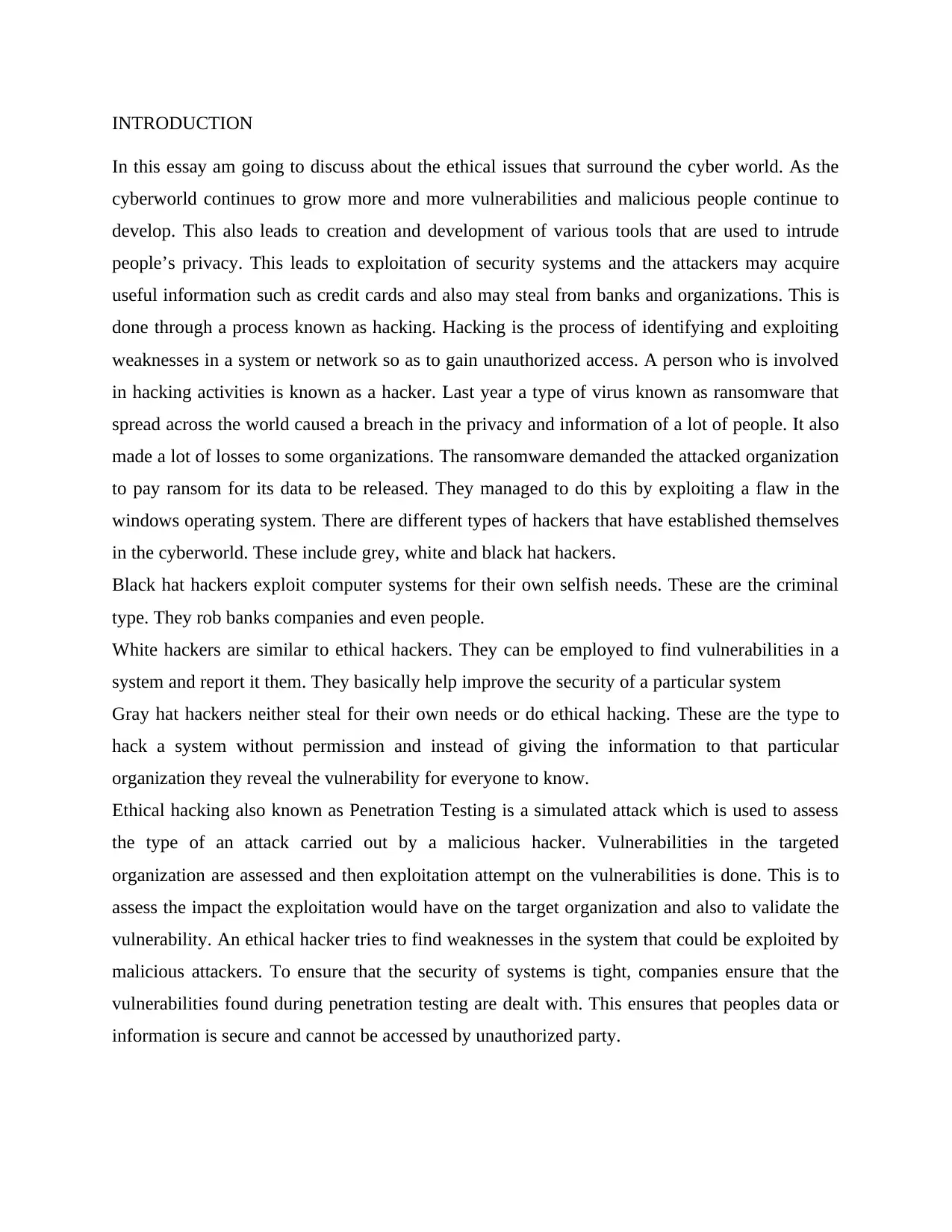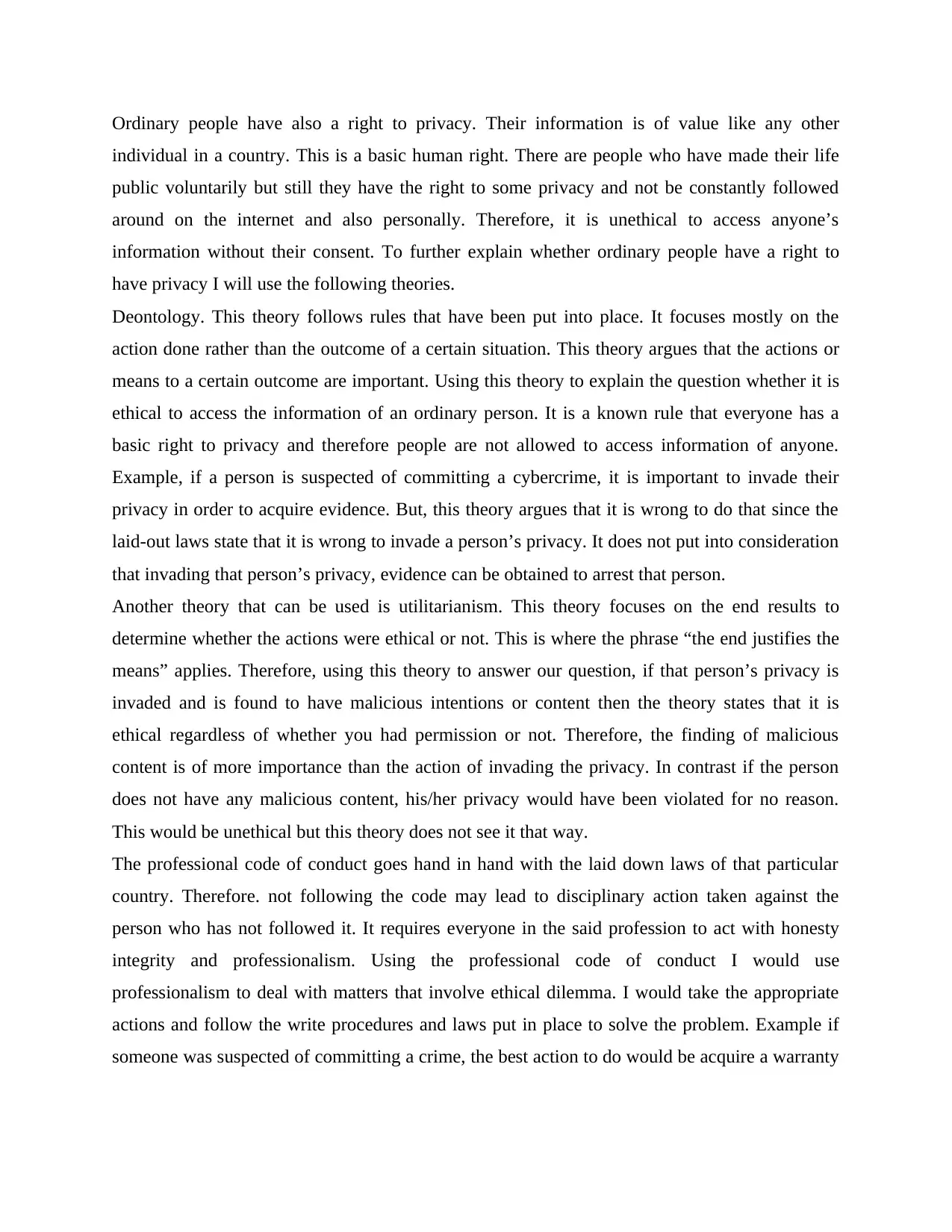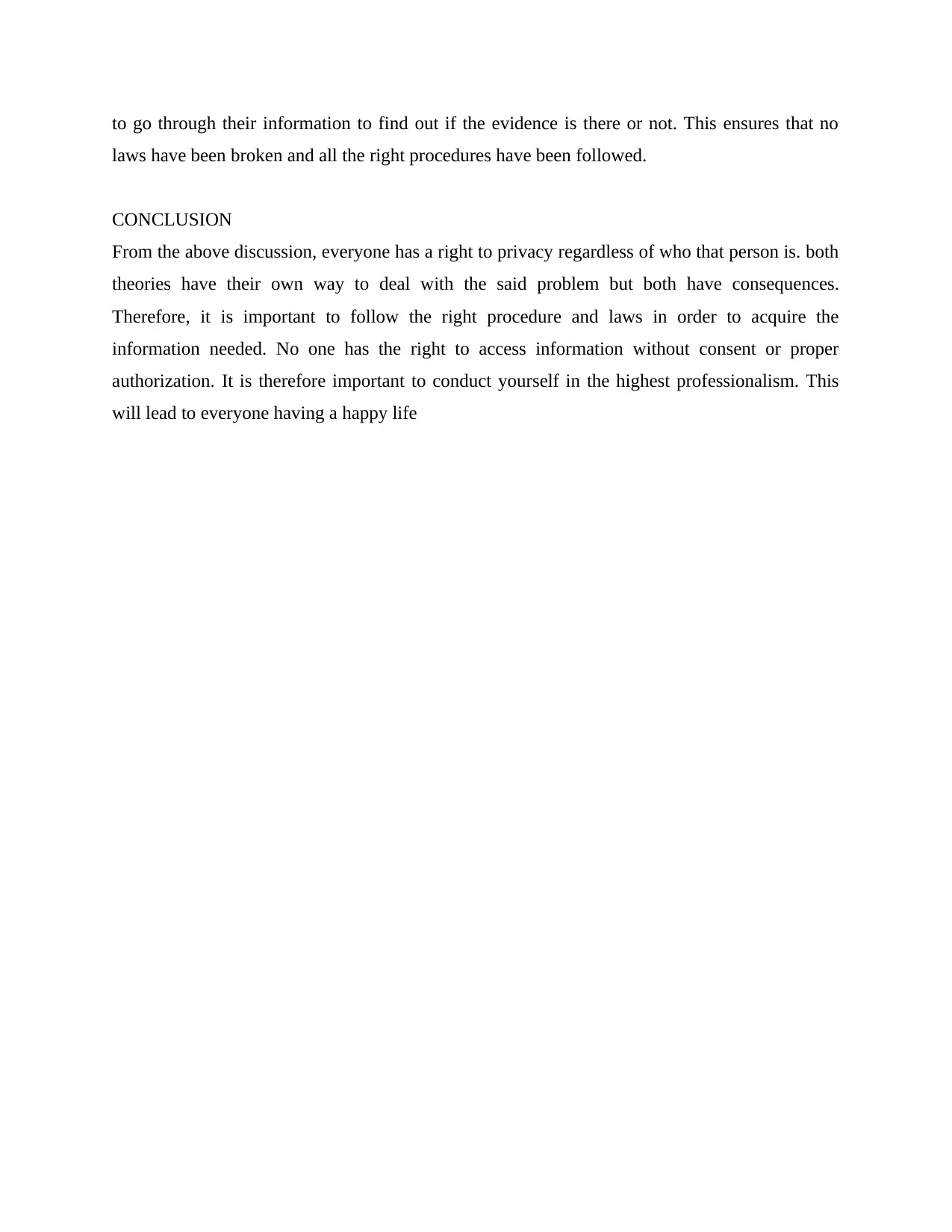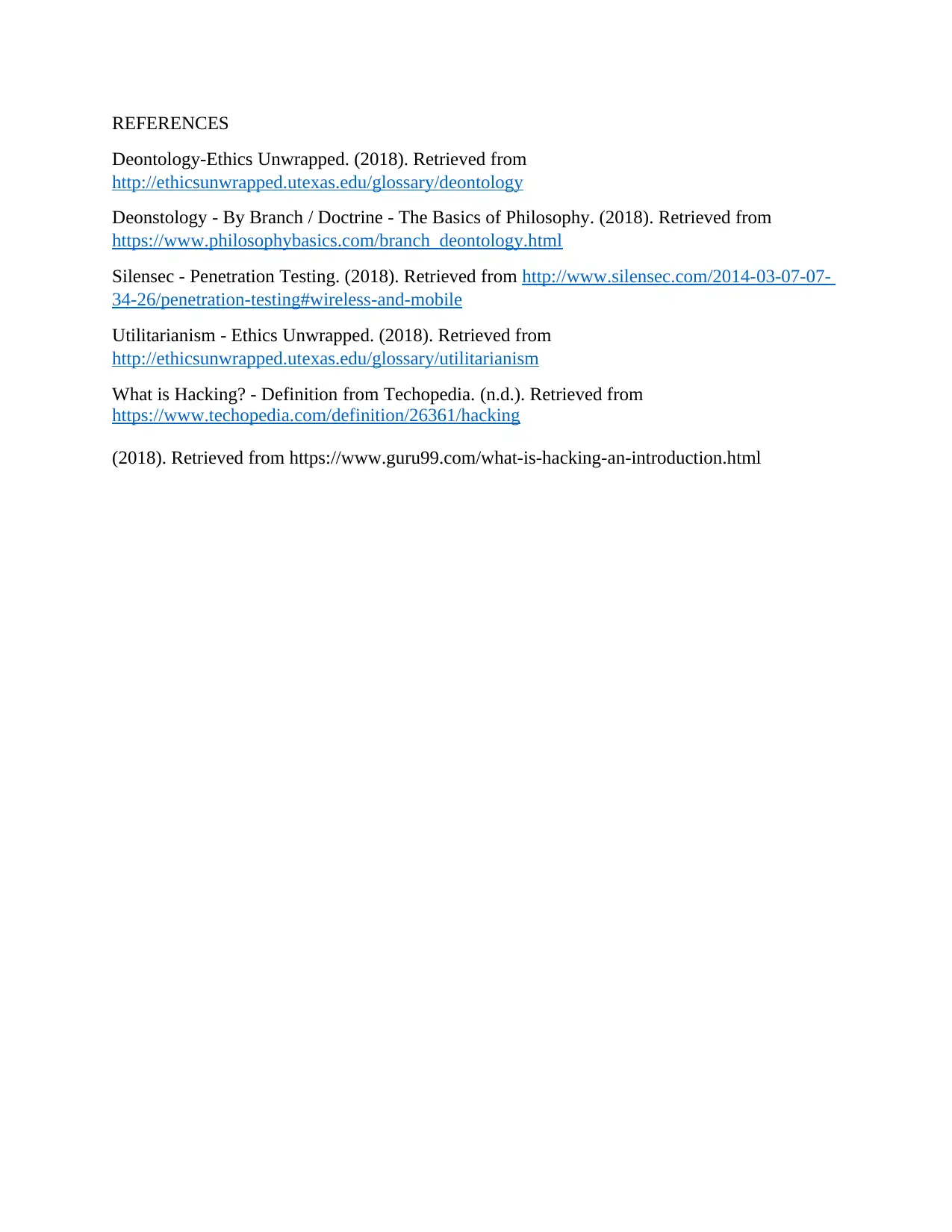Cybersecurity Ethics: Transparency, Accountability, and Privacy
VerifiedAdded on 2023/06/11
|4
|1178
|341
Essay
AI Summary
This essay discusses the ethical issues in the cyber world, focusing on hacking, privacy, and accountability. It explores different types of hackers and the ethical implications of their actions. The essay uses deontology and utilitarianism to analyze whether it is ethical to access an ordinary person's information without consent. It also considers the professional code of conduct, emphasizing the importance of honesty, integrity, and professionalism. The essay concludes that everyone has a right to privacy and that it is crucial to follow proper procedures and laws to acquire necessary information, emphasizing the need for ethical conduct in the cyber world.

INTRODUCTION
In this essay am going to discuss about the ethical issues that surround the cyber world. As the
cyberworld continues to grow more and more vulnerabilities and malicious people continue to
develop. This also leads to creation and development of various tools that are used to intrude
people’s privacy. This leads to exploitation of security systems and the attackers may acquire
useful information such as credit cards and also may steal from banks and organizations. This is
done through a process known as hacking. Hacking is the process of identifying and exploiting
weaknesses in a system or network so as to gain unauthorized access. A person who is involved
in hacking activities is known as a hacker. Last year a type of virus known as ransomware that
spread across the world caused a breach in the privacy and information of a lot of people. It also
made a lot of losses to some organizations. The ransomware demanded the attacked organization
to pay ransom for its data to be released. They managed to do this by exploiting a flaw in the
windows operating system. There are different types of hackers that have established themselves
in the cyberworld. These include grey, white and black hat hackers.
Black hat hackers exploit computer systems for their own selfish needs. These are the criminal
type. They rob banks companies and even people.
White hackers are similar to ethical hackers. They can be employed to find vulnerabilities in a
system and report it them. They basically help improve the security of a particular system
Gray hat hackers neither steal for their own needs or do ethical hacking. These are the type to
hack a system without permission and instead of giving the information to that particular
organization they reveal the vulnerability for everyone to know.
Ethical hacking also known as Penetration Testing is a simulated attack which is used to assess
the type of an attack carried out by a malicious hacker. Vulnerabilities in the targeted
organization are assessed and then exploitation attempt on the vulnerabilities is done. This is to
assess the impact the exploitation would have on the target organization and also to validate the
vulnerability. An ethical hacker tries to find weaknesses in the system that could be exploited by
malicious attackers. To ensure that the security of systems is tight, companies ensure that the
vulnerabilities found during penetration testing are dealt with. This ensures that peoples data or
information is secure and cannot be accessed by unauthorized party.
In this essay am going to discuss about the ethical issues that surround the cyber world. As the
cyberworld continues to grow more and more vulnerabilities and malicious people continue to
develop. This also leads to creation and development of various tools that are used to intrude
people’s privacy. This leads to exploitation of security systems and the attackers may acquire
useful information such as credit cards and also may steal from banks and organizations. This is
done through a process known as hacking. Hacking is the process of identifying and exploiting
weaknesses in a system or network so as to gain unauthorized access. A person who is involved
in hacking activities is known as a hacker. Last year a type of virus known as ransomware that
spread across the world caused a breach in the privacy and information of a lot of people. It also
made a lot of losses to some organizations. The ransomware demanded the attacked organization
to pay ransom for its data to be released. They managed to do this by exploiting a flaw in the
windows operating system. There are different types of hackers that have established themselves
in the cyberworld. These include grey, white and black hat hackers.
Black hat hackers exploit computer systems for their own selfish needs. These are the criminal
type. They rob banks companies and even people.
White hackers are similar to ethical hackers. They can be employed to find vulnerabilities in a
system and report it them. They basically help improve the security of a particular system
Gray hat hackers neither steal for their own needs or do ethical hacking. These are the type to
hack a system without permission and instead of giving the information to that particular
organization they reveal the vulnerability for everyone to know.
Ethical hacking also known as Penetration Testing is a simulated attack which is used to assess
the type of an attack carried out by a malicious hacker. Vulnerabilities in the targeted
organization are assessed and then exploitation attempt on the vulnerabilities is done. This is to
assess the impact the exploitation would have on the target organization and also to validate the
vulnerability. An ethical hacker tries to find weaknesses in the system that could be exploited by
malicious attackers. To ensure that the security of systems is tight, companies ensure that the
vulnerabilities found during penetration testing are dealt with. This ensures that peoples data or
information is secure and cannot be accessed by unauthorized party.
Paraphrase This Document
Need a fresh take? Get an instant paraphrase of this document with our AI Paraphraser

Ordinary people have also a right to privacy. Their information is of value like any other
individual in a country. This is a basic human right. There are people who have made their life
public voluntarily but still they have the right to some privacy and not be constantly followed
around on the internet and also personally. Therefore, it is unethical to access anyone’s
information without their consent. To further explain whether ordinary people have a right to
have privacy I will use the following theories.
Deontology. This theory follows rules that have been put into place. It focuses mostly on the
action done rather than the outcome of a certain situation. This theory argues that the actions or
means to a certain outcome are important. Using this theory to explain the question whether it is
ethical to access the information of an ordinary person. It is a known rule that everyone has a
basic right to privacy and therefore people are not allowed to access information of anyone.
Example, if a person is suspected of committing a cybercrime, it is important to invade their
privacy in order to acquire evidence. But, this theory argues that it is wrong to do that since the
laid-out laws state that it is wrong to invade a person’s privacy. It does not put into consideration
that invading that person’s privacy, evidence can be obtained to arrest that person.
Another theory that can be used is utilitarianism. This theory focuses on the end results to
determine whether the actions were ethical or not. This is where the phrase “the end justifies the
means” applies. Therefore, using this theory to answer our question, if that person’s privacy is
invaded and is found to have malicious intentions or content then the theory states that it is
ethical regardless of whether you had permission or not. Therefore, the finding of malicious
content is of more importance than the action of invading the privacy. In contrast if the person
does not have any malicious content, his/her privacy would have been violated for no reason.
This would be unethical but this theory does not see it that way.
The professional code of conduct goes hand in hand with the laid down laws of that particular
country. Therefore. not following the code may lead to disciplinary action taken against the
person who has not followed it. It requires everyone in the said profession to act with honesty
integrity and professionalism. Using the professional code of conduct I would use
professionalism to deal with matters that involve ethical dilemma. I would take the appropriate
actions and follow the write procedures and laws put in place to solve the problem. Example if
someone was suspected of committing a crime, the best action to do would be acquire a warranty
individual in a country. This is a basic human right. There are people who have made their life
public voluntarily but still they have the right to some privacy and not be constantly followed
around on the internet and also personally. Therefore, it is unethical to access anyone’s
information without their consent. To further explain whether ordinary people have a right to
have privacy I will use the following theories.
Deontology. This theory follows rules that have been put into place. It focuses mostly on the
action done rather than the outcome of a certain situation. This theory argues that the actions or
means to a certain outcome are important. Using this theory to explain the question whether it is
ethical to access the information of an ordinary person. It is a known rule that everyone has a
basic right to privacy and therefore people are not allowed to access information of anyone.
Example, if a person is suspected of committing a cybercrime, it is important to invade their
privacy in order to acquire evidence. But, this theory argues that it is wrong to do that since the
laid-out laws state that it is wrong to invade a person’s privacy. It does not put into consideration
that invading that person’s privacy, evidence can be obtained to arrest that person.
Another theory that can be used is utilitarianism. This theory focuses on the end results to
determine whether the actions were ethical or not. This is where the phrase “the end justifies the
means” applies. Therefore, using this theory to answer our question, if that person’s privacy is
invaded and is found to have malicious intentions or content then the theory states that it is
ethical regardless of whether you had permission or not. Therefore, the finding of malicious
content is of more importance than the action of invading the privacy. In contrast if the person
does not have any malicious content, his/her privacy would have been violated for no reason.
This would be unethical but this theory does not see it that way.
The professional code of conduct goes hand in hand with the laid down laws of that particular
country. Therefore. not following the code may lead to disciplinary action taken against the
person who has not followed it. It requires everyone in the said profession to act with honesty
integrity and professionalism. Using the professional code of conduct I would use
professionalism to deal with matters that involve ethical dilemma. I would take the appropriate
actions and follow the write procedures and laws put in place to solve the problem. Example if
someone was suspected of committing a crime, the best action to do would be acquire a warranty

to go through their information to find out if the evidence is there or not. This ensures that no
laws have been broken and all the right procedures have been followed.
CONCLUSION
From the above discussion, everyone has a right to privacy regardless of who that person is. both
theories have their own way to deal with the said problem but both have consequences.
Therefore, it is important to follow the right procedure and laws in order to acquire the
information needed. No one has the right to access information without consent or proper
authorization. It is therefore important to conduct yourself in the highest professionalism. This
will lead to everyone having a happy life
laws have been broken and all the right procedures have been followed.
CONCLUSION
From the above discussion, everyone has a right to privacy regardless of who that person is. both
theories have their own way to deal with the said problem but both have consequences.
Therefore, it is important to follow the right procedure and laws in order to acquire the
information needed. No one has the right to access information without consent or proper
authorization. It is therefore important to conduct yourself in the highest professionalism. This
will lead to everyone having a happy life
⊘ This is a preview!⊘
Do you want full access?
Subscribe today to unlock all pages.

Trusted by 1+ million students worldwide

REFERENCES
Deontology-Ethics Unwrapped. (2018). Retrieved from
http://ethicsunwrapped.utexas.edu/glossary/deontology
Deonstology - By Branch / Doctrine - The Basics of Philosophy. (2018). Retrieved from
https://www.philosophybasics.com/branch_deontology.html
Silensec - Penetration Testing. (2018). Retrieved from http://www.silensec.com/2014-03-07-07-
34-26/penetration-testing#wireless-and-mobile
Utilitarianism - Ethics Unwrapped. (2018). Retrieved from
http://ethicsunwrapped.utexas.edu/glossary/utilitarianism
What is Hacking? - Definition from Techopedia. (n.d.). Retrieved from
https://www.techopedia.com/definition/26361/hacking
(2018). Retrieved from https://www.guru99.com/what-is-hacking-an-introduction.html
Deontology-Ethics Unwrapped. (2018). Retrieved from
http://ethicsunwrapped.utexas.edu/glossary/deontology
Deonstology - By Branch / Doctrine - The Basics of Philosophy. (2018). Retrieved from
https://www.philosophybasics.com/branch_deontology.html
Silensec - Penetration Testing. (2018). Retrieved from http://www.silensec.com/2014-03-07-07-
34-26/penetration-testing#wireless-and-mobile
Utilitarianism - Ethics Unwrapped. (2018). Retrieved from
http://ethicsunwrapped.utexas.edu/glossary/utilitarianism
What is Hacking? - Definition from Techopedia. (n.d.). Retrieved from
https://www.techopedia.com/definition/26361/hacking
(2018). Retrieved from https://www.guru99.com/what-is-hacking-an-introduction.html
1 out of 4
Related Documents
Your All-in-One AI-Powered Toolkit for Academic Success.
+13062052269
info@desklib.com
Available 24*7 on WhatsApp / Email
![[object Object]](/_next/static/media/star-bottom.7253800d.svg)
Unlock your academic potential
Copyright © 2020–2026 A2Z Services. All Rights Reserved. Developed and managed by ZUCOL.





